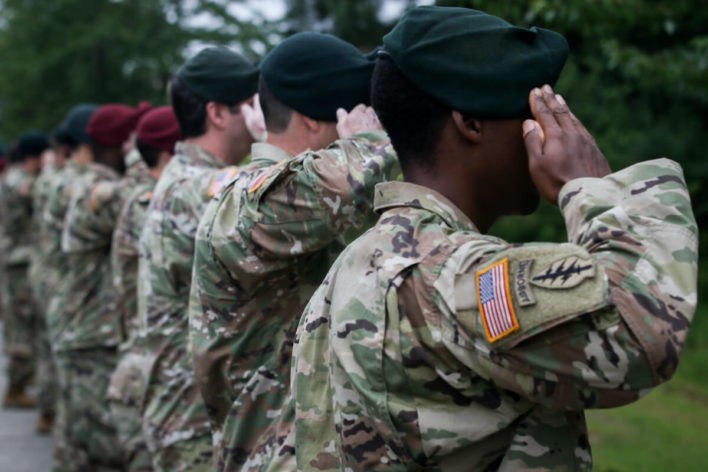10 Things Employers Need to Know About Veteran Employees

What Employers Should Know About Their Veteran Employees
As a civilian employer who hires veterans, you might be curious about what to expect. Veterans bring a variety of important skills to the workplace. They take what they have learned while in the military and apply that to their civilian jobs. Veterans can be a big asset to any civilian company.
Some veterans have never worked in the civilian world, having joined the military at a young age. Others have had experience before their time in the military, but many years have passed since that time.
As an employer, there are things you should know about your veteran employees. Learning more about them will make for a smoother workplace. Here are 10 things employers should know about their veteran employees. What follows are not 10 skills veterans bring to the workplace, or 10 suggestions for how military members can add value to your organization.
Instead, this is more about what it means to hire the vet and how their experiences in uniform may shape how they approach working for a civilian employer.
>> Never miss a benefits update. Subscribe to the MyMilitaryBenefits Newsletter today.
Top 10 Things Employers Need to Know About Veteran Employees
1) There are some topics veterans might not want to share
There are some topics and questions that you want to stay away from. Something as simple as asking about a specific war experience can be unwanted and uncomfortable for the veteran. It is best for employers to stick to more general questions about military service. Some questions can be seen as offensive, even if it doesn’t seem that way to you.
2) They can struggle to find an equivalent job in the civilian world
Some jobs in the military don’t exactly translate to civilian jobs. If a veteran has served in the infantry, finding a comparable job can be a bit more difficult than if they served as an MP. Although any job in the military can give the skills veterans need to find a job in their post-military world, finding one that fits exactly can be a bit of a struggle, depending on what the veteran did while serving in the military.
3) There is plenty of uncertainty
There are many different reasons why someone leaves the military, from medical reasons to wanting to ETS to pursue something else. Working towards the next step of their life can bring plenty of uncertainty. While in the military, life is very structured, from your paycheck to where you live. Stepping out into a different type of work environment can be challenging, even if it is the next natural step on their career path.
4) Veterans are individuals
America views veterans as heroes, and rightly so, but sometimes that means they are not being viewed as individuals. Veterans are strong and brave, but they are also individual people with their own goals, dreams, and desires. They want to be accepted into the workforce and for others to recognize what they bring to their careers, not to be seen as just another veteran.
>> Never miss a benefits update. Subscribe to the MyMilitaryBenefits Newsletter today.
5) Directness is important
The military is run in such a way that directness is essential. The chain of command gives the orders, and the soldier complies. There isn’t time to discuss the ins and outs or the whys of everything. You might not understand this, especially if you are in a more casual workplace setting, but it is important to remember that this is where the veteran could be coming from.
6) They might feel unprepared for the transition
Transitioning from the military is a significant step, and some veterans may feel unprepared during this process. There might not have been as much time in between an ETS and the start of a new post-military job as they felt they needed. Employers should have an understanding of this and make space for the transition period.
7) Too many choices can be overwhelming
While serving in the military, service members have limited control over the outcome. In the civilian world, employees can be given more of a choice. This can be a bit overwhelming at first and is something to keep in mind when hiring a veteran.
8) They believe in service
Veterans obviously believe in service. At some point in their lives, they decided to put on the uniform to serve their country. This type of personality will carry over into the civilian world and into their post-military career. This can be a big plus for the workplace.
9) They understand and respect leadership
The military runs on leadership. Veterans value this and understand a chain of command. While in the civilian world, leadership may look a little different than it does in the military, know that the veteran respects those in higher positions and will work within those boundaries.
10) They understand teamwork
Teamwork is a big part of serving in the military. Veterans are very used to working with others to get the job done. They had to be in the military and will be able to take that skill with them into their civilian job.
The transition from serving in the military to working in the civilian workplace can be challenging. Employers might not totally understand where veterans are coming from or what they have been through but there is plenty of room for understanding one another.
>> Never miss a benefits update. Subscribe to the MyMilitaryBenefits Newsletter today.
RELATED:
About the author
Julie Provost is a freelance writer, and blogger. She lives in Tennessee with her National Guard husband and three boys.


